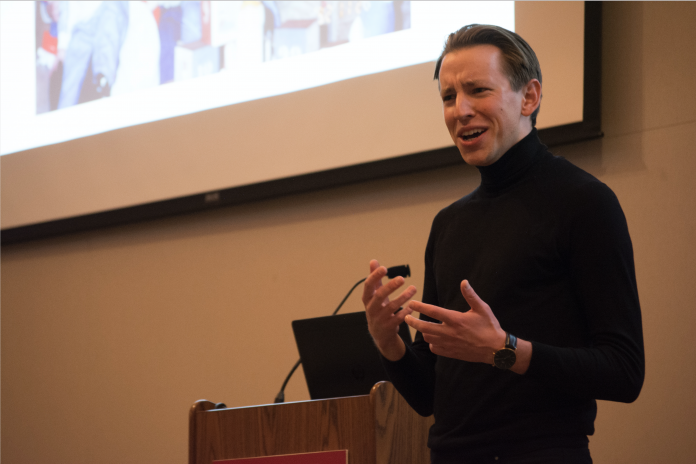
When you see the word elephant, what comes to mind? The color grey? A trunk? Peanuts? The circus? The word ‘elephant’ triggers your neuron frame, or thoughts and visualizations derived from your own moral base. On Thursday, Feb. 22, Garrett Blad presented fellow environmentalists with their biggest challenge — how do we fit the phrase ‘climate change’ into everyone’s moral base?
“If people don’t find it meaningful, they won’t find it true,” said Blad, the Executive Coordinator of SustainUS, at his talk titled “Reframing Climate Change: How we change the story to build power and win.” Blad’s talk, sponsored by the Environmental Activism Team (EnAcT), offered students progressive strategies for communicating the importance of our contemporary climate change crisis.
Historically, climate change has inspired feelings of guilt and insignificance rather than hope and effort. Blad focused on positive reinforcement as well as community-based action to avoid potential accusations or messages of guilt.
“The elephants are being stirred in America by frames that are really against everything that I believe — everything that’s going to help us to solve climate change which is coming together, being a community and caring for every person no matter where they come from,” said Blad in a question and answer session after the talk.
With only 50 minutes of climate change broadcast news coverage in 2016 (according to Media Matters for America), the conversation can be hard to continue, or even start. The urgency gap of long- and short-term issues puts climate change in the backs of many Americans’ minds — a quarter of us never even hear someone we know talk about it according to a poll by the Center for Climate Change Communication.
“We do need to address a broader impact of getting the media to cover this crisis in a way that they’ve never done,” said Blad. “I think we’re going to do that through a lot of creative ways like moral protest and engaging in disruptions … hopefully there will be a tipping point where they change their mindset and start covering this pretty regularly.” Blad also touched on the “BIG US, small them,” idea, emphasizing the democratic values that America’s political system was founded on.
“The only way we’re really going to face this is by saying ‘there are a few people that have made decisions that have got us in this mess and those people should be held responsible for those decisions,” added Blad, “‘because it’s endangering the lives of millions and millions of people across the planet.’”
Students in attendance found that Blad’s overall themes of positivity, personalization and a sense of communal action resonated well within a mostly likeminded crowd. However, the real task is getting these messages to resonate outside of the presentation-space.
“The next time I’m talking to my family about the newest data that’s come out about climate change, I’ll relate it more to something that’s important to them,” said Marta Rardin ‘20, EnAcT’s Public Relations Representative, “just like how when you would talk to someone or ask them about their job, so that it’s in the context of something they deal with in their day-to-day lives.”
Putting the story into the perspective and vernacular of the audience is one of the first steps to get more and more Americans on board. Often times, the language of scientists can be convoluted or intimidating — even to the people that study it. As more and more people continue to become active in mitigating climate change, Americans will continue to see more and more positive returns.
“It’s easy to be scared and to think myactions aren’t even going to count toward anything,” said Rardin. “If we can start performing positive actions, there will be positive outcomes. They may not be the ones we expect, but we can start something. We just have to start.”
Layout Editor Ian Adler is a sophomore and Environmental Science major. Ian usually spends his time outside, playing music, juicing oranges or hanging out with his Zeta Beta Tau brothers.





















